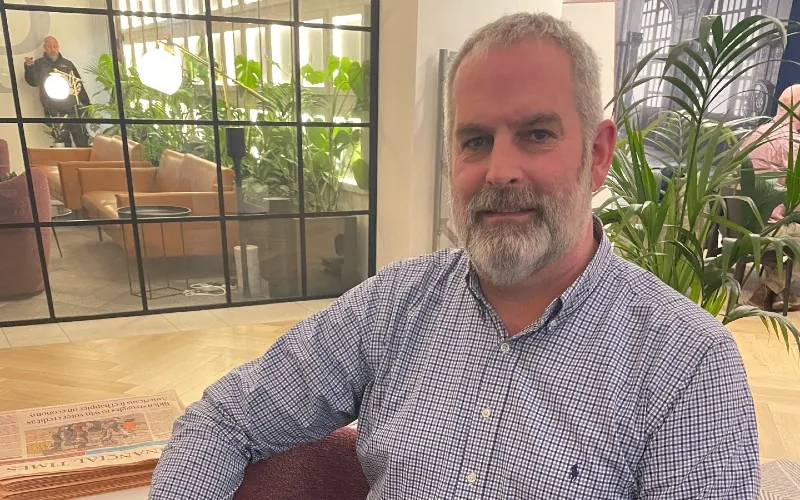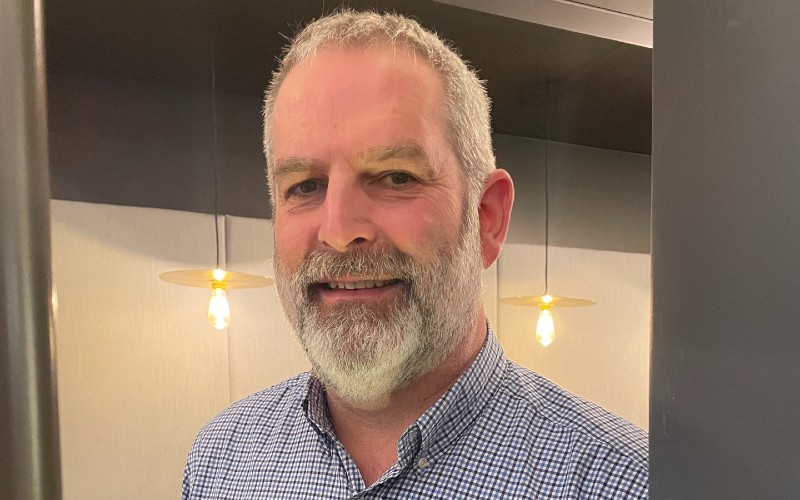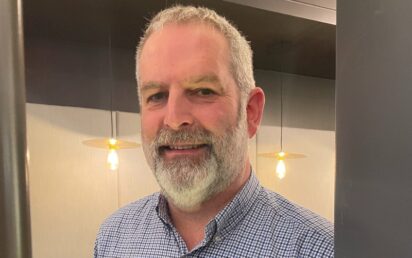As 6ft 7ins tall Rory Cameron is hard to miss. He isn’t an outwardly emotional man and when he talks about the moment his MedTech business Gendius went into administration, he isn’t looking for sympathy or scapegoats, instead preferring to see it as a learning.
The 51-year-old hasn’t spoken publicly before about the collapse of his Alderley Park-based startup but it’s clear he has learnt a huge amount from the experience.
“The worst thing is family members,” he recalls. “I had cousins and my brother had invested money because they believed in what I was doing.
“It was that letting go but still feeling hugely responsible. I had this sick feeling that I’d let people down. The amazing team that had been with me on the journey and our investors.
“We were caught in the startup trap of having all our eggs in one basket. When AstraZeneca decided not to press ahead with the commercial licensing deal the game was up.”
Last week Manchester-based hiring platform Orka Technology Group joined the growing ranks of companies going into administration. It came just three years after they announced a £29m investment round.
Cameron went through the same process in December 2023 and wants to share the experience to help others.
Founded in 2015, the startup created a ground-breaking algorithm that could better identify which patients with type 2 diabetics were most likely to develop chronic kidney disease (CKD).
Gendius piloted the algorithm in over 19 countries, screened 500,000 type 2 diabetes patients in less than six months and raised £4m.
Cameron compared the fateful final meeting with AstraZeneca to a game a poker.
Game of poker
“I had four aces in my hand but didn’t have the money to call my fellow players,” he recalled. “We had the validation and regulatory approval for our chronic kidney disease calculator but didn’t have the financial runway to go any further.
Gendius’ pre-screening CKD tech granted UK regulatory approval
“I have lots of learnings and now is the right time to talk about it to help other entrepreneurs on their journey.”
Cameron’s own journey with Gendius started in 2015, following an impressive 20-year career in pharma, including a decade at AstraZeneca.
“The idea for Gendius came from my co-founder Chris Genders after he developed Type 2 diabetes at age of 50,” he explained. “He would tell you himself, he was not the best at managing his diabetes.
“He played rugby years ago at Sales Sharks so he’s always been a fit guy. At the age of 50 he wasn’t feeling right so went to the doctors and found out he had diabetes.
“Soon after his diagnosis he had a foot ulcer followed by a small heart attack.
“Although he knew about diabetes what he didn’t know about was the side-effects and what would happen next and how quickly these things can happen.
“That’s where the idea for Gendius came from. We wanted to make sure that anybody else diagnosed with type 2 diabetes would not just wander into getting kidney failure, foot ulcers, heart attacks etc. We wanted to educate them in understanding their risk and help them do something about it.

Rory Cameron, co-founder, Gendius
“It’s really quite a horrible disease. It’s the number one cause of kidney failure, blindness and lower limb amputation. You’ve also got about a 2.5x increased risk of dying from a heart attack or stroke.
“You get the shock of the diagnosis but then you get the worry about all these things that might be around the corner.
“Chris and I met at a service station on the M6 to discuss it and it went from there.”
For the first two years Cameron didn’t take a salary from the business.
“Originally we were looking at an app-based platform to help patients manage their disease better and then we were getting pharma clients to purchase licences for that product,” he said. “Doctors could then manage patients via the app remotely.
“The challenge with that is patients wouldn’t pay. It’s the usual story. As we went further into it, we realised if we could find out the true risk of these individual diseases we could then get pharma clients to pay for it because they had the drugs as a solution.
“Healthcare providers were also interested as people were being diagnosed and treated earlier before they developed costly complications. It was a win-win-win.”
The game-breaker for Gendius was the creation of an algorithm that would better predict which patients with type 2 diabetes would go on to develop chronic kidney disease.
Cameron said: “One of the things about chronic kidney disease is you don’t feel your kidneys getting worse. It’s like blood pressure. You can lose up to 50 per cent of your kidney capacity – in effect one of your kidneys.
“It’s only at that point that you feel any different so you present too late to do anything about it other than going onto dialysis and wait for a kidney transplant.
“The figures in the US show that nine out of 10 patients with kidney disease are unaware that they have it. Globally in 2023 approximately 850 million people had CKD.”
Gendius’ algorithm was based on five key data points – age, blood pressure; gender; body mass index; and how long a patient has had diabetes for.
Trials showed the algorithm had an 80 per cent success rate of predicting which patients would have a positive test for chronic kidney disease. It also reduced the number of patients you needed to send for laboratory diagnostic testing by over 50 per cent.
Raised £4m
It was a compelling case and Gendius raised £4m in investment from a mixture of VC; crowdfunding; grant funding; and high net worth individuals.
Cameron said: “Someone once said to me that as a CEO his job was 11 months of fundraising, one month to have a holiday and recharge his batteries and then he was straight back in it. That’s exactly what it is.
“If you wait to raise your funds until you need them it’s the worst time to raise your money because then you’re desperate for it and often your cash runway is too short.”
Gendius’ next big break came when they took part in Pitch@Palace, a programme set up by Prince Andrew, and met representatives of AstraZeneca.
“They had their own clinical data sets and they paid for our clinical team to access their data,” he said.
“We ended up looking at the records of these patients to see who was most at risk of kidney disease. We tracked them over five years but we went back rather than having to do it again. We identified the clinical risk factors that could be used to predict who went on to get CKD.”
The largest single test was in Taiwan with more than 150,000 patients.
“It was a complete game-changer,” said Cameron. “There’s a group called the International Diabetes Federation (IDF) and we ended up on their website, the first pre-screening algorithm for chronic kidney disease (CKD) to do so. This was being shared with all their members.
“The next thing we were working on, and we’d had discussion with AstraZeneca on, was identifying people at risk of heart failure, further down the line looking at fatty liver disease.”
In 2023 Cameron stepped up his efforts to secure new funding when the bombshell dropped in May that his wife Anna had been diagnosed with cancer.
“I’d been at a family wedding in Mexico when she called me with the news that a biopsy had confirmed cancer,” he said.
While that was going on in the background, Cameron was locked in make-or-break talks with AstraZeneca that he hoped would secure the future of Gendius.
“In April 2023 we launched the algorithm across 19 different countries,” he said.
“During this journey we’d also got data sharing agreements with over 100 GP practices in the UK.
“From these practices we could extract anonymised data, millions of data points around metabolic diseases. We could use these for new algorithms in heart failure, fatty liver disease and other metabolic diseases.
“At the end of doing this trial with AstraZeneca, when we screened 500,000 patients in six months, the plan was they would then agree to a licensing fee.”
The trials found that 300,000 of the screened 500,000 patients with type 2 diabetes were at high risk of developing chronic kidney disease.
“Those were brand new cases and AstraZeneca had one of a new class of drugs that have been shown to stabalises the kidney, basically a wonder drug,” he said.
“We had 300,000 patients there who could be diagnosed earlier and given this drug that may result in them never having kidney failure.”
Put simply Cameron hoped AstraZeneca would buy a licence from Gendius to turn the business into a SaaS-based business with £1m ARR.
The two sides met in September when AstraZeneca indicated they wanted to screen 7.2 million people in 2024.
However, by October, the pharmaceutical giant had slashed this number down to 1.2 million patients.
“I’m thinking ‘how do I hit £1m ARR with 1.2m patients? That’s what I need. How do we even breakeven on that?’,” recalled Cameron.
End of the road
However, four weeks later, it got even worse when AstraZeneca told Cameron at a meeting in Cambridge that they didn’t want to go ahead all.
“I felt physically sick,” admitted Cameron. “At that point I didn’t know how we would be able to move forward. We’d told the investors that we were looking at doing 7.2m screenings. They thought that was positive. Then we went back to our investors to say it wasn’t 7.2m screenings but 1.2m.
“Then a few weeks later you’re going back to them again to say it was nothing so the investors are saying ‘we don’t believe you any more’.”
Cameron also recalls how he felt a huge responsibility for team of regulatory specialists, data scientists, IT developers and others that he’d brought together.
He said their last ‘roll of the dice’ was to try and secure an Innovate UK investor partnership grant with the support of Praetura but when that failed the call to the administrators followed.
“I had to phone investors to say they’d lost their money,” he said. “We had two big investors in the US who’d invested £1m each in the company and I was humbled by their responses ‘Rory, you gave it a massive go. You and the team should be proud of what you did. These investors understood the risk and didn’t see what we had achieved as a failure, even though they had lost their investment.
“There was a genuine understanding over the last couple of years that raising money has been really hard. The markets have been in a difficult place. But it is interesting as not many share these experiences.”
Today Cameron is no longer involved in the company and his wife’s treatment for cancer has gone well.
He bears no ill will toward AstraZeneca, understanding that the focus can change and so can budgets and personnel, but the consequences for startups can be dire.
However it hasn’t put him off and he’s looking for his next role supporting other CEOs or coming back as a CEO of a later stage business.
- On April 18th, Rory Cameron will be taking place in a business breakfast entitled ‘How to spot a perfect investor from a poisonous one’. It’s been organised by Sanderson Recruitment in association with TechBlast. Register here


